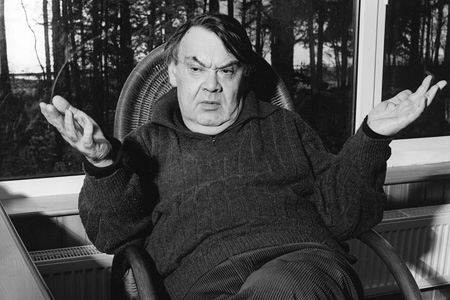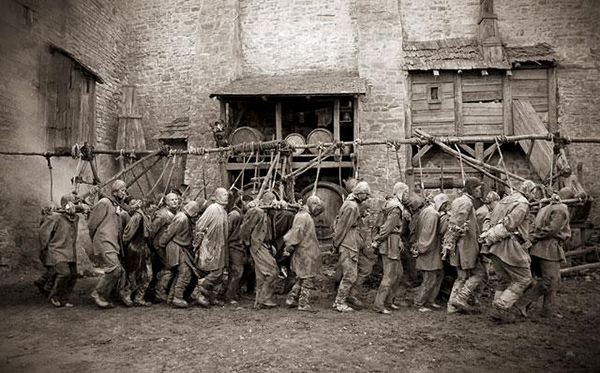
Alexei German: I Invented This Planet
/ Главная / Russkiy Mir Foundation / Publications / Alexei German: I Invented This PlanetAlexei German: I Invented This Planet

Great Russian filmmaker Alexei German passed away on Thursday, February 21, during the 75th year of his life, in St. Petersburg. It’s hard to overestimate the place of German in Russian cinematographic art. He created such masterpieces as My Friend Ivan Lapshin, Twenty Days without War, Checking on Roads, I Need a Car, Khrustalev! and others. In the words of his lifetime friend and cinema historian Lyubov Arkus, German for the national cinematograph was like Tolstoy and Dostoyevsky for the Russian literature. In the opinion of film critic Andrei Plakhov, “several eras of Russian cinematograph were gone with German.”
The master’s last and uncompleted work was The History of the Arkanar Massacre after Hard to Be a God by the brothers Strugatsky. Work on the movie was long and challenging. Mr. German planned to make this film in the late 1980s, but the filming commenced only in 1998. Cinema lovers have been waiting for this film for several years. In the words of the director’s son, the picture is almost finished; the only thing left is the sound track. Alexei German did not like publicity, but occasionally spoke about his work. Below is one of the last interviews with the filmmaker where he told about his last film.
– Everyone familiar with the story of brothers Strugatsky has his own mental picture of the Arkanar State where the main plot of the book unwinds – dictators, reformers, philosophers and villains, heroes and antiheroes as well as the noble don Rumata. Alexei German, based on the prose, invented his own planet.
– I do not know whether there was a planet like that, and whether there was such a time. I just invented it and firmly believe in its existence. I was looking at the canvases of Bosch and Bruegel and came up with something in between. We invented people, their way of living and religion. We know how they sleep, know their perversions and dreams; we invented them and believed in this world. For us this is like a different planet that repeats the history of the Earth, to which it is similar only in some respects. Flying there from Planet Earth are historians who must be counts, marquises, ministers and draw their own conclusions, give their recommendations, but not much beyond that, because it’s clear that nobody can change the course of history – maybe only accelerate it a bit, but almost imperceptibly, or this will end in a bloodshed. And my hero loses his temper, because at some dreadful moment, the bloody peak of the national history, he takes a sword and starts decimating the filth… But we actually are not quite sure whether this is real Earth. It is, but somewhat different. We cannot topple it only because we came out with our own religion that looks similar to Christianity, though it is not entirely Christian.

– The choice of actor Leonid Yarmolnik as the main star in Hard to Be a God amazed many. A jolly old blade, showman and popular TV presenter, this former actor of Taganka Theatre came in sight of Alexei German quite accidentally, didn’t he?
– I did not even know he was a cinema actor. He presented some rather stupid game on TV, where cash prizes and gifts were raffled. I looked at him and saw a rather sturdy, weasel-faced fellow, definitely not an actor. I liked his looks, but he caught my eyes only for several minutes and I forgot about him. There is another actor named Lykov. He played in The Cops TV series, a worthy, weasel-faced actor who does not jump anywhere. I generally dislike actors, because in this country we are short of good actors; the situation is a little better with actresses. American actors know how to play with their eyes and other parts of their body even in most horrible movies; they always have certain strain in their eyes, but Russian actors, even the most famous ones, have cow’s eyes, “de-energized” eyes; they do not care about their eyes. And I wanted Lykov to star in the film and said I’d work with him, with his eyes, but Lykov signed a contract with some long TV series and did not tell me. This was inadmissible because I needed an actor who would put his best efforts into that project. Then I switched to this TV man and he acted quite well in movie tests. I approved him and ordered costumes to be sewn… I almost fainted when a Czech producer told me that Yarmolnik had a track record of 65 films.
– Yet we’d like to understand the message of the film made by such a great master as Alexei German. What will be the images of his Arkanar State in the finale?
– This film is about us and our not the very bright prospects. This seems to be the most relevant and up-to-date picture of all I am filming at present. This will be an earthly plot on how we tried to build democracy in the country that staunchly resists any such efforts and that particular world also evades these efforts. It will take decades and centuries before anything changes. I do not see them. There has been no thralldom in Russia only several years, and when chains were lifted from people, some of them started stealing and others got into trouble.
Interviewer: Mumin Shakirov
Source: Svoboda radio station
| Tweet |
New publications

 Mikhail Kalatozov, a director who transformed the world of cinematography in many ways, was born 120 years ago. He was a Soviet film official and a propagandist. Above all, he was capable of producing movies that struck viewers with their power and poetic language.
Mikhail Kalatozov, a director who transformed the world of cinematography in many ways, was born 120 years ago. He was a Soviet film official and a propagandist. Above all, he was capable of producing movies that struck viewers with their power and poetic language.  Ukrainian authorities have launched a persecution campaign against the canonical Ukrainian Orthodox Church (UOC), the biggest one in the country's modern history. Over the past year, state sanctions were imposed on clergy representatives, searches were conducted in churches, clergymen were arrested, criminal cases were initiated, the activity of the UOC was banned in various regions of the country, and monasteries and churches were seized.
Ukrainian authorities have launched a persecution campaign against the canonical Ukrainian Orthodox Church (UOC), the biggest one in the country's modern history. Over the past year, state sanctions were imposed on clergy representatives, searches were conducted in churches, clergymen were arrested, criminal cases were initiated, the activity of the UOC was banned in various regions of the country, and monasteries and churches were seized.  When Nektary Kotlyaroff, a fourth-generation Russian Australian and founder of the Russian Orthodox Choir in Sydney, first visited Russia, the first person he spoke to was a cab driver at the airport. Having heard that Nektariy's ancestors left Russia more than 100 years ago, the driver was astonished, "How come you haven't forgotten the Russian language?" Nektary Kotlyaroff repeated his answer in an interview with the Russkiy Mir. His affinity to the Orthodox Church (many of his ancestors and relatives were priests) and the traditions of a large Russian family brought from Russia helped him to preserve the Russian language.
When Nektary Kotlyaroff, a fourth-generation Russian Australian and founder of the Russian Orthodox Choir in Sydney, first visited Russia, the first person he spoke to was a cab driver at the airport. Having heard that Nektariy's ancestors left Russia more than 100 years ago, the driver was astonished, "How come you haven't forgotten the Russian language?" Nektary Kotlyaroff repeated his answer in an interview with the Russkiy Mir. His affinity to the Orthodox Church (many of his ancestors and relatives were priests) and the traditions of a large Russian family brought from Russia helped him to preserve the Russian language.

 The leaders of the Friends of the Great Russia cultural association (Amici Della Grande Russia) in Italy believe that the Western policy of abolishing Russian culture in Europe has finally failed. Furthermore, it was doomed to failure from the beginning.
The leaders of the Friends of the Great Russia cultural association (Amici Della Grande Russia) in Italy believe that the Western policy of abolishing Russian culture in Europe has finally failed. Furthermore, it was doomed to failure from the beginning.  Name of Vladimir Nemirovich-Danchenko is inscribed in the history of Russian theater along with Konstantin Stanislavski, the other founding father of the Moscow Art Theater. Nevertheless, Mr. Nemirovich-Danchenko was a renowned writer, playwright, and theater teacher even before their famous meeting in the Slavic Bazaar restaurant. Furthermore, it was Mr. Nemirovich-Danchenko who came up with the idea of establishing a new "people's" theater believing that the theater could become a "department of public education."
Name of Vladimir Nemirovich-Danchenko is inscribed in the history of Russian theater along with Konstantin Stanislavski, the other founding father of the Moscow Art Theater. Nevertheless, Mr. Nemirovich-Danchenko was a renowned writer, playwright, and theater teacher even before their famous meeting in the Slavic Bazaar restaurant. Furthermore, it was Mr. Nemirovich-Danchenko who came up with the idea of establishing a new "people's" theater believing that the theater could become a "department of public education."  "Russia is a thing of which the intellect cannot conceive..." by Fyodor Tyutchev are famous among Russians at least. December marks the 220th anniversary of the poet's birth. Yet, he never considered poetry to be his life's mission and was preoccupied with matters of a global scale. Mr.Tyutchev fought his war focusing on relations between Russia and the West, the origins of mutual misunderstanding, and the origins of Russophobia. When you read his works today, it feels as though he saw things coming in a crystal ball...
"Russia is a thing of which the intellect cannot conceive..." by Fyodor Tyutchev are famous among Russians at least. December marks the 220th anniversary of the poet's birth. Yet, he never considered poetry to be his life's mission and was preoccupied with matters of a global scale. Mr.Tyutchev fought his war focusing on relations between Russia and the West, the origins of mutual misunderstanding, and the origins of Russophobia. When you read his works today, it feels as though he saw things coming in a crystal ball...